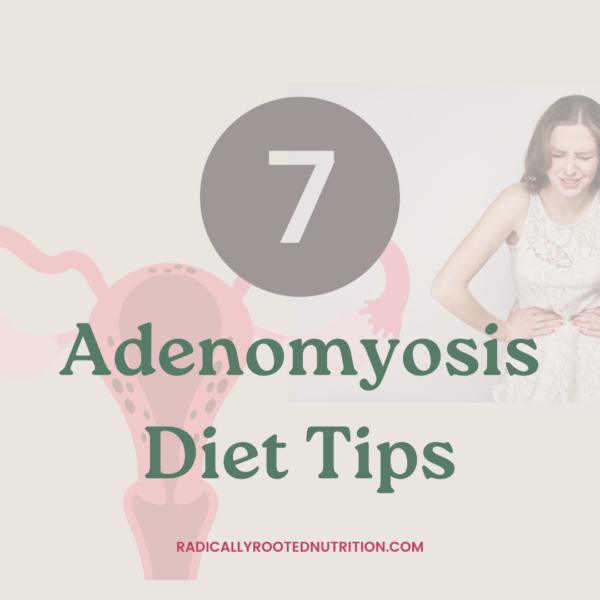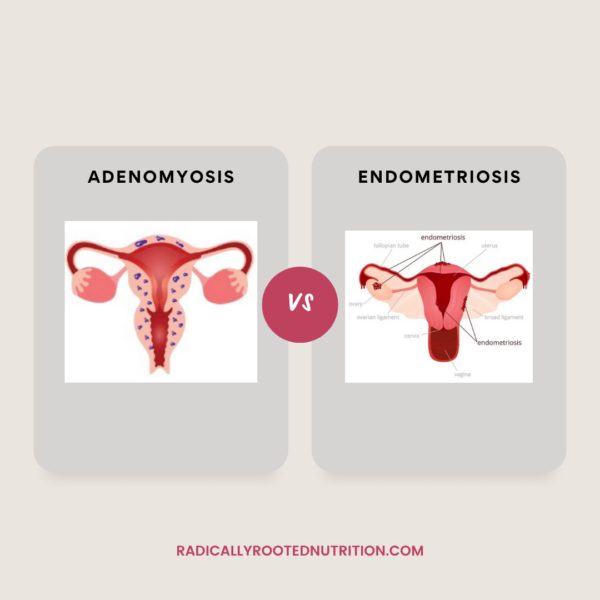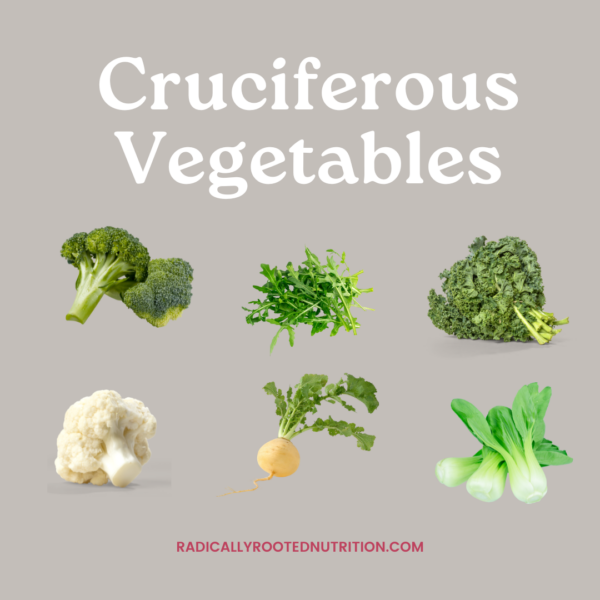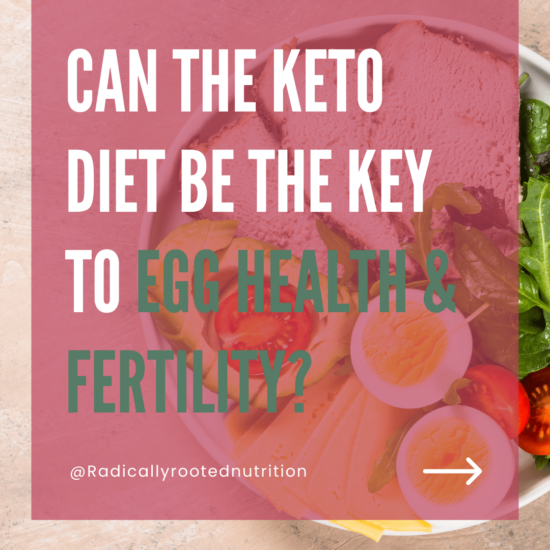7 Adenomyosis Diet Tips to Boost Fertility
Adenomyosis, often confused with endometriosis, is a condition affecting the uterus that causes heavy periods, severe cramping, and pelvic pain. While the exact cause remains unclear, hormonal imbalances, inflammation, and genetic factors are known contributors. This condition not only impacts physical health but also takes a significant emotional toll on affected women. Luckily, an adenomyosis diet can help manage symptoms and boost fertility. Let’s talk about it…

Adenomyosis and Fertility
Adenomyosis can have a profound impact on fertility, making it difficult for affected women to conceive and carry a pregnancy to term. While medical treatments are available, dietary changes can play a crucial role in managing symptoms and enhancing fertility. This blog post explores three key dietary tips to help women with adenomyosis optimize their reproductive health.
Adenomyosis is found in 7.5% of young infertile women, with a higher prevalence in women over 40 years old. According to a 2021 study, women with adenomyosis experience a 43% reduction in the odds of clinical pregnancy and face a threefold increase in miscarriage risk. The condition is also linked to severe obstetric complications, including increased risks of pre-eclampsia, small-for-gestational-age babies, and preterm deliveries.
Signs and Symptoms
Despite many symptoms, one in three patients with adenomyosis is asymptomatic. Common symptoms include:
- Heavy menstrual bleeding
- Pelvic pain
- Infertility
Most patients are diagnosed between 40 to 50 years of age. Adenomyosis can coexist with other conditions such as endometriosis and uterine fibroids.
Water also aids in the proper functioning of the kidneys and liver, which play a significant role in hormone regulation. Staying hydrated supports these processes, helping to maintain the hormonal balance necessary for conception.
Adenomyosis vs. Endometriosis: Key Differences
While adenomyosis and endometriosis share similarities, they have unique characteristics.
Adenomyosis involves tissue damage within the uterine walls whereas endometriosis involves tissue growth outside the uterus.
Unlocking Fertility: The Impact of the Keto Diet on Egg Freezing For many clients, the quest for the optimal diet […]
The Adenomyosis Diet
Although specific nutritional guidelines for adenomyosis are lacking, there are general dietary recommendations that can improve quality of life, manage symptoms, and optimize fertility for individuals with adenomyosis.
1. Eat More Cruciferous Vegetables
Vegetables like broccoli, Brussels sprouts, kale, cabbage, and cauliflower are called cruciferous vegetables. They are sometimes referred to as ‘brassica’ vegetables. These vegetables are rich in glucosinolates. According to a review by Wu et al. (2021), glucosinolates help change estrogens into non-active forms, helping to keep your hormones balanced. This is particularly beneficial for those managing adenomyosis, which gets worse with excess estrogen. Eating more of these vegetables can help keep your hormones in check naturally.
2. Increase Antioxidant Intake
Increasing the consumption of antioxidant-rich foods is essential. Antioxidants reduce oxidative stress and inflammation, which are both common in adenomyosis. Studies show that women with conditions like adenomyosis often have lower antioxidant levels which worsens symptoms. Adding antioxidant-rich fruits and vegetables, such as blueberries, raspberries, strawberries, cranberries, artichokes, kale, beets, cabbage, and red grapes, can alleviate symptoms and promote hormonal balance.
3. Optimize Intake of Omega-3 Fatty Acids
Limiting trans and saturated fats, found in red meat and highly processed foods, while ensuring a diet rich in omega-3 fatty acids is beneficial. Omega-3s are powerful antioxidants that help reduce inflammation. Research shows that consuming high amounts of omega-3 can significantly reduce inflammation, beneficial for conditions like endometriosis and potentially adenomyosis. Oily fish such as Atlantic salmon, mackerel, sardine, and trout are significant sources of omega-3. Two to three servings of these fish per week are recommended to help manage adenomyosis symptoms.
4. Focus on Fiber-Rich Foods
Increasing your intake of fiber-rich foods is crucial for managing adenomyosis symptoms. A high-fiber diet can help regulate estrogen levels by promoting its excretion through the digestive system. Additionally, fiber supports gut health, which is essential for overall hormonal balance and inflammation management. Include plenty of whole grains, legumes, fruits, and vegetables in your diet to boost your fiber intake.

5. Stay Hydrated
Proper hydration is vital for managing adenomyosis symptoms and supporting overall reproductive health. Aim to drink plenty of water throughout the day. Herbal teas, particularly those with anti-inflammatory properties like ginger or chamomile, can also be beneficial. Adequate hydration helps flush toxins from the body and may help reduce bloating and discomfort associated with adenomyosis.
6. Consider Meal Timing and Frequency
Some research suggests that eating smaller, more frequent meals throughout the day can help manage inflammation and hormone fluctuations. This approach may help stabilize blood sugar levels and reduce the severity of adenomyosis symptoms. Consider dividing your daily food intake into 5-6 smaller meals instead of 3 large ones.
7. Incorporate Anti-Inflammatory Herbs and Spices
Adding anti-inflammatory herbs and spices to your meals can provide additional benefits. Turmeric, ginger, and cinnamon have potent anti-inflammatory properties and can be easily incorporated into various dishes. For example, try adding turmeric to smoothies, sprinkling cinnamon on oatmeal, or using ginger in stir-fries and teas.

Foods to Avoid or Limit
While focusing on beneficial foods is important, it’s equally crucial to be aware of foods that may exacerbate adenomyosis symptoms:
- Caffeine: Can increase inflammation and worsen pain.
- Alcohol: May disrupt hormone balance and increase inflammation.
- Processed foods: Often high in unhealthy fats and sugars, which can promote inflammation.
- Trans fats: Found in many fried and processed foods, these can increase inflammation in the body.
Practical Recipes
Incorporating these dietary changes can be simple and delicious. Here are a few practical tips and recipes:
- Cruciferous Vegetable Stir-Fry: Sauté broccoli, Brussels sprouts, and kale with garlic and olive oil for a nutrient-packed side dish.
- Antioxidant Smoothie: Blend blueberries, strawberries, kale, and a splash of almond milk for a refreshing and antioxidant-rich smoothie.
- Omega-3 Rich Salad: Top a bed of mixed greens with grilled salmon, walnuts, and a lemon vinaigrette for a heart-healthy meal.
- Anti-inflammatory Golden Milk: Warm plant-based milk with turmeric, cinnamon, and a pinch of black pepper for a soothing bedtime drink.
Lifestyle Considerations
In addition to dietary changes, other lifestyle factors can complement symptom management and fertility enhancement. Regular exercise, stress management techniques such as yoga or meditation, and ensuring adequate sleep are all important for overall well-being. Maintaining a healthy weight is also crucial, as excess body fat can contribute to increased estrogen levels and inflammation, potentially exacerbating adenomyosis symptoms.
Bottom Line
In conclusion, by making thoughtful dietary adjustments, you can manage your symptoms and potentially enhance your fertility. Incorporating cruciferous vegetables, antioxidant-rich foods, and omega-3 fatty acids can promote hormonal balance and reduce inflammation. As every case is unique, personalized nutrition plans can offer tailored solutions for optimal health and fertility outcomes. For personalized recommendations and support, consider scheduling an appointment with one of our fertility dietitians. They can help create a diet plan that addresses your specific needs and improves your quality of life.




